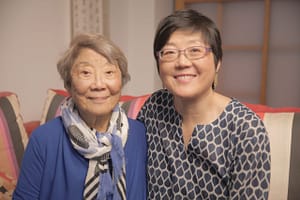By Corinne Carey
“The idea of medical aid in dying makes me uncomfortable.”
“Talking about death makes me uncomfortable.”
“I’m not comfortable voting for the bill.”
“This bill makes some of my constituents uncomfortable.”
“I’m not comfortable talking to you about this issue.”
I’ve heard some variation of these responses from lawmakers when we try to schedule meetings to discuss the New York Medical Aid in Dying Act.

Corinne Carey, NY & NJ Senior Campaign Director, Compassion & Choices
When journalists ask me why the bill seems to be stuck, I’m often at a loss for words. The bill has overwhelming support among voters (72%, including majority support regardless of age, political affiliation, region, and religion) and the support of more than 50 organizations representing the diversity of New York. Legislative leaders say we don’t have the votes – but I know that if the bill were put to the floor for a vote, it would overwhelmingly pass with broad bipartisan support.
So what is the hold up?
I think I finally have a clearer understanding of why it appears that this bill is stuck.
It’s the discomfort of it all.
Legislative leaders and some lawmakers are simply uncomfortable talking about medical aid in dying.
I understand their feelings.
I led the campaign to pass New Jersey’s Medical Aid in Dying for the Terminally Ill Act. The law, passed in 2019, has provided comfort to untold numbers of people just across the border because just knowing this option is available gives them comfort and peace of mind, whether they use it (less likely) or not (more likely). And at the end of the day, less than 1% of people who die in states where medical aid in dying is legal actually use it.
When the first health department report to the legislature was released, showing that 12 people had used the law in its first five months, I turned to my husband and said: “I helped 12 people die.” The gravity of that overwhelmed me for a moment.
But without missing a beat, my husband reminded me: “You didn’t help 12 people die. You helped 12 people who were dying have a peaceful death and avoid needless suffering.” I shook my head, astonished that I had temporarily forgotten that key point.
I understand the discomfort some lawmakers feel, because I felt it at that moment.
So I ask our legislative leaders and those lawmakers who have yet to engage in a serious conversation about this bill, to imagine how much more uncomfortable it must be to:
. . . be a nurse, doctor, hospice worker, or other healthcare provider feeling powerless as their patient cries out repeatedly in pain, knowing that there are some patients whose pain and suffering outpaces even the best hospice and palliative care.
. . . be someone who has to sit next to the bed of a loved one who is begging to die, knowing there is nothing you can do to help ease their pain.
. . . be someone who is facing death themselves, knowing that there is nothing between now and the inevitable end but an increase in suffering.

The late Fay Ho Yin and her daughter Monona Yin
I think of Monona Yin of Brooklyn, and the discomfort she felt, caring for her dying mother, Fay Hoh Yin. Fay was diagnosed with incurable T-cell lymphoma in 2015, underwent countless treatments until it returned in 2019, and she died – advocating for medical aid in dying – in July 2020. Fay told Monona about her own mother’s suffering at the end. Her mother had told her, “I want to die but I cannot die. I want to live but I cannot live.” Imagine how uncomfortable it was for Monona to watch her mother die feeling the same as her mother did many years before.
These are truly uncomfortable experiences.
I invite lawmakers to consider how uncomfortable they might feel if a constituent, or someone in their own lives, comes to them six months from now and says: “I am suffering. Why didn’t you vote to approve this option that I need now?” Will you be comfortable saying to them: “The discussion made me uncomfortable”?
Talking about medical aid in dying – whether you support it or oppose it – is just about giving people options at the inevitable end of life that we all will face one day. It’s about making sure that terminally ill people in our state have the same access to comprehensive end-of-life care that folks in New Jersey, Vermont, California, and 7 other states (and Washington, D.C.) now have.
For those who oppose medical aid in dying nothing will change if the bill is passed.
No terminal patient has to request it. No physician has to prescribe it. No pharmacist has to fill the prescription. If that is their choice, passing the law will have no effect on them.
But passing the law will provide comfort to so many, even if they never choose medical aid in dying or even if they receive but never use the prescription. Over the last quarter-century, the data shows that about one-third of the terminally ill individuals who receive the prescription never take it.
And here’s the most important point – that even I sometimes forget – these people were going to die imminently no matter what.
Passing this law is an act of love and compassion. As Fay Hoh Yin explained, “Medical aid in dying would free me to spend all my remaining energy just living, knowing that I would not end up in a dark hole of suffering.”
Speaker Heastie, Leader Stewart-Cousins, on behalf of your constituents, the majority of your conferences, and the 72% of New Yorkers who support this end-of-life care option:
Overcome your discomfort, for those who face unbearable discomfort.
Show New York voters your compassion, love, and grace.
Let the Legislature debate and vote on the Medical Aid in Dying Act — as suggested by the New York Daily News — for what I am confident will be certain overwhelming, bipartisan passage.
Corinne Carey is the New York and New Jersey senior campaign director for Compassion & Choices. She lives with husband David in Troy, NY.
Compassion & Choices
Media Contacts
David Blank
Media Relations Director
[email protected]
Phone: (227) 225 6553
Patricia A. González-Portillo
Senior National Latino Media Director
[email protected]
(323) 819 0310
Mail contributions directly to:
Compassion & Choices Gift Processing Center
PO Box 485
Etna, NH 03750